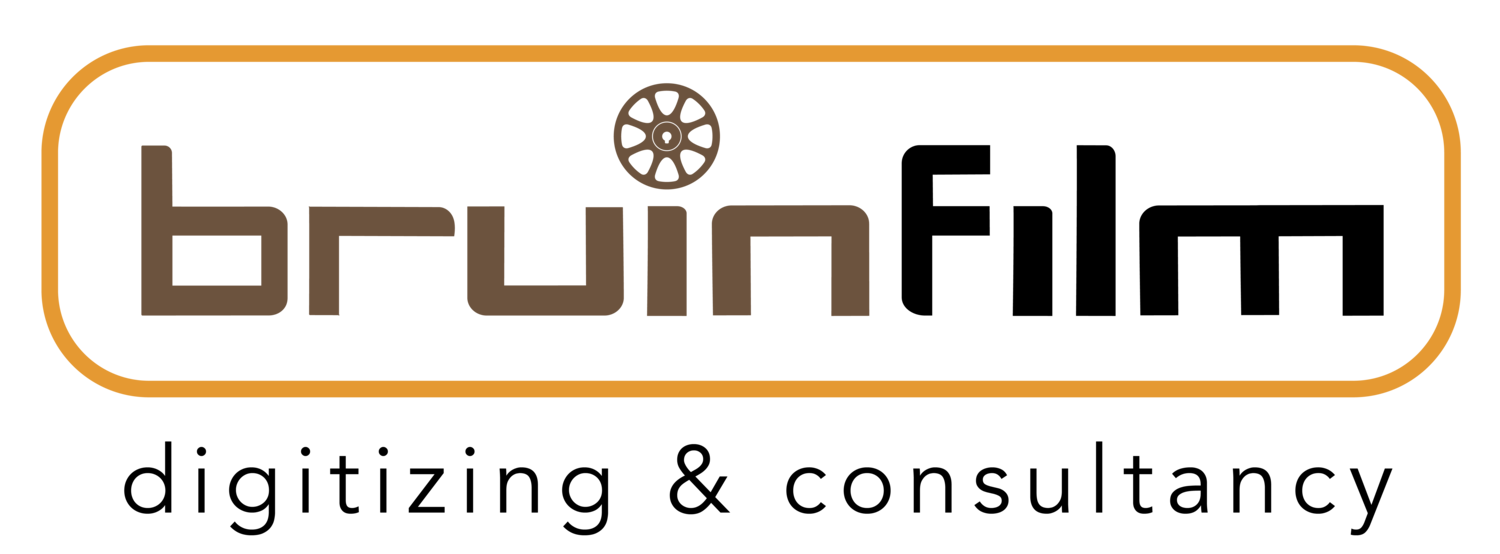About Bruinfilm
Bruinfilm digitizes (old) films for archives, companies and private customers.
In addition to digitization, you can also contact Bruinfilm for post-production and consultancy.
Cultural heritage
Film is a wonderful medium, but unfortunately fragile.
Old films can be seriously damaged when stored under the wrong climate conditions.
So don’t wait too long before you start thinking about having your films / cultural heritage digitized.
Bruinfilm delivers top quality with over 10 years of experience (including companies like Beeld & Geluid - UNESCO – CERN - Archive of Modern Conflict).
You can also contact Bruinfilm with your consumer film collection.
Customization
The digitization of film can be done in various ways.
At Bruinfilm we believe in custom work.
Large companies rely on standard settings, but at Bruinfilm your film is monitored from minute to minute.
We use custom settings and color correction so that your precious film looks its best.
Postproduction
Bruinfilm has over 10 years of experience in digitization and post-production (post-processing), like editing and colorgrading.
Consultancy
If you need extra information about your films and you want to hire a consultant from Bruinfilm, you can. It is also possible to hire a guest speaker, ask about our options.
Need advice?
Film digitization is a profession.
My name is Guido Bruin and I am the CEO of Bruinfilm.
Do you need extra help or do you want to know more about your films and the condition they are in? Or do you have another question?
I am happy to advise you!

THIS IS HOW WE DIGITIZE YOUR FILM
See the difference!
The process
1. Preparation
Manual cleaning of the films (with film cleaner and microfibre cloth).
Application of head and or tail leader.
Repairing splices that need to be renewd or replaced (up to 5 splices per reel).
2. Digitization
Digitization in HD or 2K resolution.
2K (2048: 1556), 4K (3840: 2160) and other formats are available in consultation at an additional cost.
Digitization audio (if available) (both optical and magnetic).
Basic post-processing (color correction, etc.).
3. Delivery
Two file formats, to be determined in consultation: 1. Master format, 2. Mezzanine format.
Incl. Quality controle and final check
Delivery on external hard disk (s) with USB3 connection (to be supplied by customer)
The technique
MWA Choice film scanner; a class of its own.
Bruinfilm uses the high-quality MWA Choice film scanner.
Scratches become invisible
This modular built scanning system uses diffused light so that scratches on the film itself become virtually invisible in the digital file. The scanner is suitable for all 8mm, 9.5mm and 16mm film formats. The optical sensor is of high quality so that very sharp images can be captured.
A rich sound
We have both optical and magnetic sound heads for various film formats, including 8mm, Super 8mm, 16mm and even 9.5mm film.
Stable picture
The film scanner has a very stable image position due to the use of an optical sensor. The laser "looks" at the perforation holes of the film and ensures good image stability and thus a calm image. Even if the perforation holes are (heavily) damaged, the scan will hardly be affected and the image remains stable. Moreover, the film will never be damaged, because it doesn’t have physical contact with sprockets (the gears through which the film is transported in projectors and older machines).
High resolution
The film scanner delivers an SD (720x576), HD (1920x1080) or 2K (2048x1556) resolution file and has a 12 bit color depth DPX image sequence as the highest output quality. As a standard quality for film material, we supply digitization in HD resolution.
File formats (codecs)
In the highest output quality, the Choice scanner makes a digital recording of each film frame in the uncompressed DPX format (comparable to a TIFF file). A video file (video stream) can be rendered from these individual DPX files, for example MP4 or H264 as a preview file. But also other formats such as eg QuickTime Pro-res 422 HQ or 4444, MXF Op1a (SD D10-50 or XDCAM HD or JPEG2000 SD / HD) or FFV1 files for archives.











